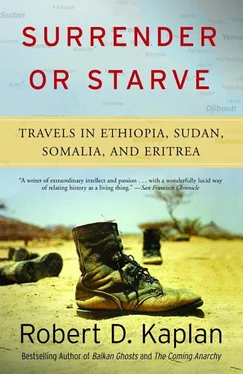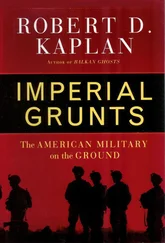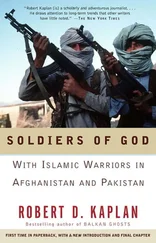The Libyan convoy that stormed into El Fasher in August 1985 stayed for about a year. It was forced out not by any U.S. pressure, which would have proved useless, but by intimidating French air sorties carried out from bases in Chad. However, by the time the Libyans had left El Fasher, they had installed themselves elsewhere in western Sudan as part of a front against French-backed Chadian government troops. The most unsettling aspect of the whole affair was the speed with which the convoy was able to get to El Fasher: it took only twelve days to cover the fourteen-hundred-mile distance from the Mediterranean port of Benghazi. In the same period, USAID was taking two weeks to bring food to El Fasher from Khartoum, only six hundred miles away. The Libyans had the advantage of driving through areas unaffected by flooding. However, no roads were available for much of the journey from Benghazi.
Libya apparently was having an easier time of it in Darfur than was the United States, whose helicopter drops were among the few bright moments in a season filled with frustration. Flood conditions were so bad in places that a truck convoy with emergency grain supplies took the better part of a month just to travel from El Fasher to El Geneina, a distance of less than two hundred miles! Other convoys were being attacked by Bedouin bandits, and relief organizations funded by USAID even were having trouble finding local drivers willing to attempt the journey out west. Expanding the scope of the helicopter operation was impractical because of the tremendous fuel costs involved. As the Libyans proved, only an army could move supplies on land great distances in such a place, and the Sudanese army, strained to the limit battling the SPLA, was practically useless—even more so after the coup.
The root cause of these logistical difficulties was USAID’s naïve reliance on Sudan Railways. Jonathan C. Randal, the senior foreign correspondent of The Washington Post, in a memorable dispatch from Khartoum described what happened.
That notoriously inefficient, government-owned corporation, long impervious to outside pressure, was to have transported 1,300 tons of sorghum daily along the final 590-mile route from the White Nile city of Kosti west to Nyala in Darfur. After successful initial deliveries in December and January, Sudan Railways abruptly ceased honoring its contract despite the doubling of normal freight rates for the grain shipments….
U.S. Agency for International Development officials continued to hope that Sudan Railways would resume functioning normally and delayed turning to road transport as a major alternative.
In recent weeks starving villagers have been reduced to breaking open anthills in search of grain, tearing leaves off trees and eating mochet, the green berry of a poisonous bush that must be soaked for three days and then boiled before it is edible….
“We didn’t think it was possible for Sudan Railways to fail entirely,” an AID official said. “We thought they could manage at 30 percent efficiency.”
U.S. officials said they remained at a loss to pinpoint reasons for the railway’s refusal to deliver grain, despite repeated, well-publicized entreaties by Gen. Abdul Rahman Swareddahab, leader of the transitional military council. …But indifferent and incompetent management, possible union opposition to the weak, military government… widespread corruption and a higher priority for traffic destined for urban centers than for remote villages are often cited.
“In the old days we would have sent in the Marines to run the railroads,” a U.S. official said, “but we cannot do that anymore.”
In a word, countless peasants lost their lives because USAID officials were insufficiently cynical about the local reality. The railway union members who held up emergency food deliveries in order to put pressure on the government were among those in the streets of Khartoum demanding a return to democracy. But what value can democracy possibly have in a culture where civic responsibility does not extend beyond the bounds of tribe and kinship? The lethal impotence of the regime that replaced Nimeiri was clear for all to see on May 26, 1985, when General Swareddahab traveled to Nyala to witness the arrival of grain supplies on Sudan Railways. When the train pulled into the station, the freight that it unloaded was not grain, as was expected, but sugar for use in making the pastries and candies eaten by city dwellers at the end of the Moslem feast of Ramadan. Had the much-hated Nimeiri still been in power, the United States at least would have been in a position to bully the government and the railway into partially living up to their commitments. In Kordofan, several weeks before Nimeiri’s overthrow, Vice President George Bush was able to make a triumphant visit to the provincial capital of El Obeid because massive amounts of U.S. grain had arrived just in time to avert a catastrophic famine. The difference between Kordofan in the winter of 1984–1985 and Darfur the following spring and summer was that in the latter instance, U.S. officials in Sudan were under greater constraints because of a new, widely acclaimed regime that insisted on more nonalignment in foreign affairs. Tens of thousands of peasants died proving this point.
In the fall, a bumper crop saved many lives, but not nearly as many as it should have because much of the grain was hoarded by local merchants in order to boost prices, thus denying food to the very people who desperately needed it. In Khartoum, meanwhile, the political situation was becoming increasingly chaotic, with communists, Baathists, Islamic fundamentalists, and Libyan-backed elements holding demonstrations and positioning themselves for the coming elections in April 1986. The Washington Post ’s David Ottaway reported that the worsening security atmosphere forced the U.S. Embassy to take “extraordinary” precautions to protect its staff. The transitional military government informed the United States that it was unable to keep track of all the Libyans and their Sudanese allies filtering in and out of the country. In one instance, a U.S. official told Ottaway, “a plane arrived from Libya with 100 people on it, only 80 of whom had passports. The others slipped through the relaxed security at the airport.” At this point, dozens of senior Sudanese officials were going back and forth to Tripoli, where they were being entertained in luxury hotels and guesthouses. Thousands of other Sudanese, including former members of Nimeiri’s State Security Force, were being given salaried jobs in Libya. Libyan oil was pouring into the country to prop up the economy, which was collapsing because the transitional regime—paralyzed by strikes and demonstrations in the weeks prior to the elections—took no effective countermeasures. U.S. personnel were reduced to throwing their hands up in the air and barricading themselves inside the embassy compound while taking different routes to work each day. Said one diplomat in an exasperated tone, “The only thing worse than an African government that says it is going to hold elections and doesn’t is one that says it is going to hold elections and actually does!”
The Libyans were less fatalistic. They acted. In March, as election fever mounted, the Libyans pulled off a brilliant campaign stunt. The SPLA had seized the important outpost of Rum-beck in the Bahr el Ghazal region of southern Sudan and then threatened to launch an offensive against the government. Having assisted the SPLA for many years, the Libyans now turned against their former allies and attacked the rebel-held town with two Tupolev-22 bombers. In the words of a senior U.S. State Department official, it was the old “good cop–bad cop” routine. No amount of helicopter drops could have impressed the politicians in Khartoum as much as did this air raid. In the midst of the April elections, the Libyans shot a U.S. Embassy communications clerk, which along with anti-U.S. demonstrations in Khartoum engendered by President Reagan’s bombing of Libya, forced the evacuation of 250 U.S. citizens, many of whom were USAID personnel who had helped with the helicopter drops and other aspects of the relief effort and who still were vital to it. The gift of “Reagan’s bread” was of little relevance to those urbanites shouting anti-U.S. slogans in the capital because these Sudanese never needed the bread in the first place.
Читать дальше












